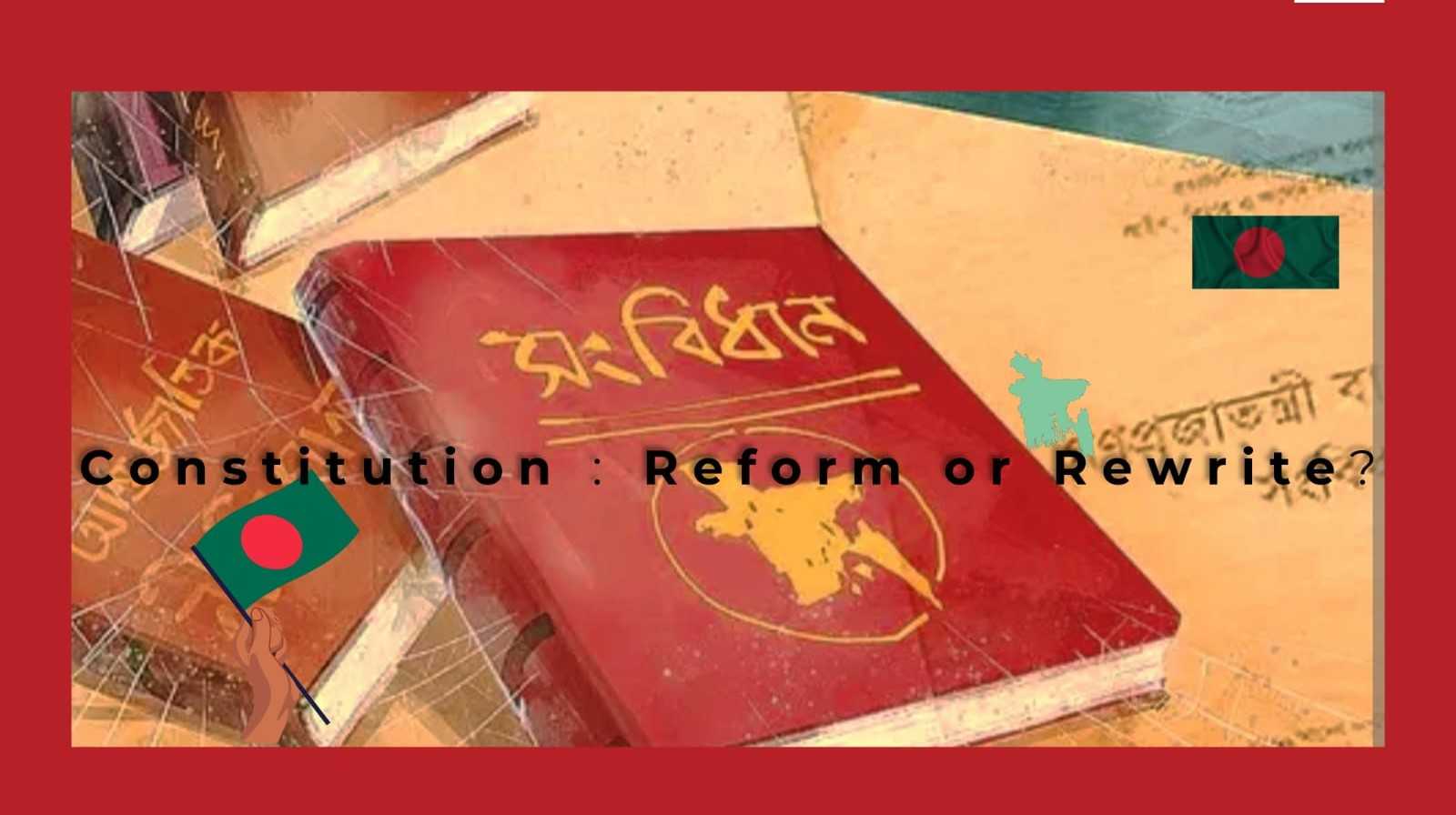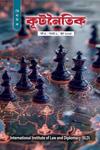
Following the historic uprising on 5th of August, an interim government was formed. Many questions have arisen regarding the formation and function of the interim govt.
- 1. Legitimacy of the interim government
The legitimacy of the interim government lies on two primary aspects: people’s will and the doctrine of necessity.
1.1 ‘People’s Will’ as Grundnorm: The Constitution of Bangladesh, adopted in 1972, has undergone substantial amendments, often serving political ends. The controversial 4th amendment and subsequent changes, especially by 15th amendment in 2011, were made to strengthen the ruling party’s grip on power. These amendments effectively turned the Constitution into a tool for authoritarianism under Sheikh Hasina’s regime, culminating in widespread public dissatisfaction. The uprising occurs in response to such dissatisfaction that was not a constitutionally justified event but a manifestation of the collective will of the people. This ‘people’s will’ can be justified by Hans Kelsen’s Pure Theory of Law, which postulates that a state’s legal order is based on a grundnorm (fundamental norm). In an article, Dr. Muhammad Ekramul Haque contended that the blood split in the revolution shifted the grundnorm or basic rule of the legal system. So, the will of the people after 2024 should be taken into consideration. The July uprising happens as a result of the mass participation of people. The leaders of the movement nominated the chief advisor and people consented to the event. Thus, ‘People’s will’ has been accepted as the new grundnorm, and the legitimacy of the interim government follows naturally. Relevantly, it is difficult to define the term ‘people’s will’ in a straight-jacket formula. In my opinion, the occurrence of any radical changes due to a mass uprising can be argued as ‘people’s will’ naturally.
1.2 Doctrine of Necessity: The interim government can also be justified under the doctrine of necessity. With Sheikh Hasina fleeing and leaving a power vacuum, it became necessary to establish governance to maintain order. The Constitution, designed for peacetime governance, does not address such revolutionary scenarios. Therefore, stepping outside the constitutional framework was necessary to prevent chaos. Notably, the doctrine of necessity was misused by many authoritarian regimes. So, the interim government should not justify their tenure by using the doctrine for an unlimited period of time. In addition, there should be a strong judicial review mechanism to assess the activities of the Government so that the interim government does not become an autocratic government.
- 2. Governing Under the Existing Constitution: A Paradox
While the interim government was formed outside the existing constitutional framework, it has paradoxically continued to operate under it. For instance, the government has adhered to procedural norms, such as taking oaths under the Constitution, issuing ordinances in its name, and hanging the portrait of Sheikh Mujibur Rahman, etc. However, this approach creates a fundamental contradiction. The uprising itself challenged the constitutional framework, particularly the authoritarian amendments introduced under Sheikh Hasina. Operating under this same Constitution undermines the revolutionary spirit of the uprising.
Additionally, unlike South Africa’s interim constitutional framework, Bangladesh’s interim government has not formulated a transitional document. Such a document could have set the foundation for governance aligned with the uprising’s objectives. The document could include provisions relating to the functions and responsibilities of the three organs of the state, provisions containing the guarantee of some fundamental rights, provisions of law making process, etc.
To resolve this paradox, the government must either fully embrace the existing Constitution (which risks betraying the revolution) or draft a new one to reflect the aspirations of the uprising.
- Reforms or Rewriting?
Rewriting the Constitution is imperative due to the inherent limitations and undemocratic provisions of the current one:
3.1 Articles 7A and 7B: Article 7A criminalizes any attempt to amend the Constitution through unconstitutional means, labeling it treason. This provision is unprecedented and incompatible with democratic principles. Given that the interim government lacks constitutional legitimacy under the current Constitution, it cannot amend the Constitution without risking accusations of treason under Article 7A. Rewriting the Constitution is thus a more practical and politically viable solution.
On the other hand, article 7B declares that over one-third of the Constitution, including the preamble and fundamental principles and at least 52 articles , is unamendable. This provision undermines the principles of popular sovereignty, which implies that the people can amend the provisions of the constitution as per the changed circumstances. There are many countries where the ‘eternity clause’ like our Article 7B has been inserted. But such clauses only protect some fundamental features of the Constitution including the character of the government (Parliamentary or Presidential), the character of the state (Unitary or federal), etc. A wholesale unamendability like ours is inconsistent with the current global constitutional gene pool.
The next elected parliament can avoid article 7B and amend it based on the argument that a specific parliament (that inserted article 7B) cannot hold a higher position than another parliament.
3.2 Judicial Review of Constitutional Amendments:
The Supreme Court’s authority to declare amendments unconstitutional (as seen in the annulment of the 8th, 5th, 7th, 13th and 16th Amendments) further complicates the prospect of amending the current Constitution. Any amendments introduced by the interim government could later be invalidated, leaving rewriting as the only viable option.
3.3 Undemocratic Provisions:
The Constitution contains several provisions that contradict democratic values and the rule of law. For example, Article 48(3) renders the President powerless by making them dependent on the Prime Minister’s advice. In addition, Article 70 curtails MPs’ rights to vote against their party, effectively undermining parliamentary democracy. Besides, preventive detention under Article 33 and emergency provisions have been frequently misused for political ends.
- Can the Interim Government Reform or Rewrite the Constitution?
As a government formed through people’s will, the interim administration holds the legal and political mandate to pursue constitutional reforms. However, the process must be inclusive and transparent to ensure legitimacy. Two possible approaches include: constituent assembly and expert committee.
4.1 Constituent Assembly: The interim government could organize elections to form a Constitutional Assembly tasked with drafting a new Constitution. This assembly would reflect the diversity of the population and ensure broad-based participation. The assembly may work as the parliament after completing the constitution making process. To illustrate from some post-revolutionary constitutions, the South African Constitution (1996) and Tunisian Constitution (2014) were made by the Constituent Assembly.
4.2 Expert Committee and Referendum: Alternatively, the government could appoint a panel of legal and constitutional experts to draft a new Constitution. This draft would then be subjected to public scrutiny and approved through a nationwide referendum.
- Recommendations for the Interim Government:
First, Drafting and implementing an interim Constitution to guide governance during the transition period. Then, arranging an election to form a Constituent assembly or appoint an expert committee to draft a new Constitution. Lastly, ensuring public participation and approval through a referendum.
In conclusion, by prioritizing people’s will and adopting international best practices, Bangladesh can pave the way for a truly democratic and just constitutional framework.
This article was originally published on BILS Bangladesh. Views in this article are author’s own and do not necessarily reflect IILD policy.
Abuzar Gifari is a Research Officer at the International Institute of Law and Diplomacy (IILD). He is currently pursuing his LL.M at the University of Dhaka, where he also completed his LL.B. His research interests span various aspects of law with a focus on advancing academic and practical insights.





Leave a reply